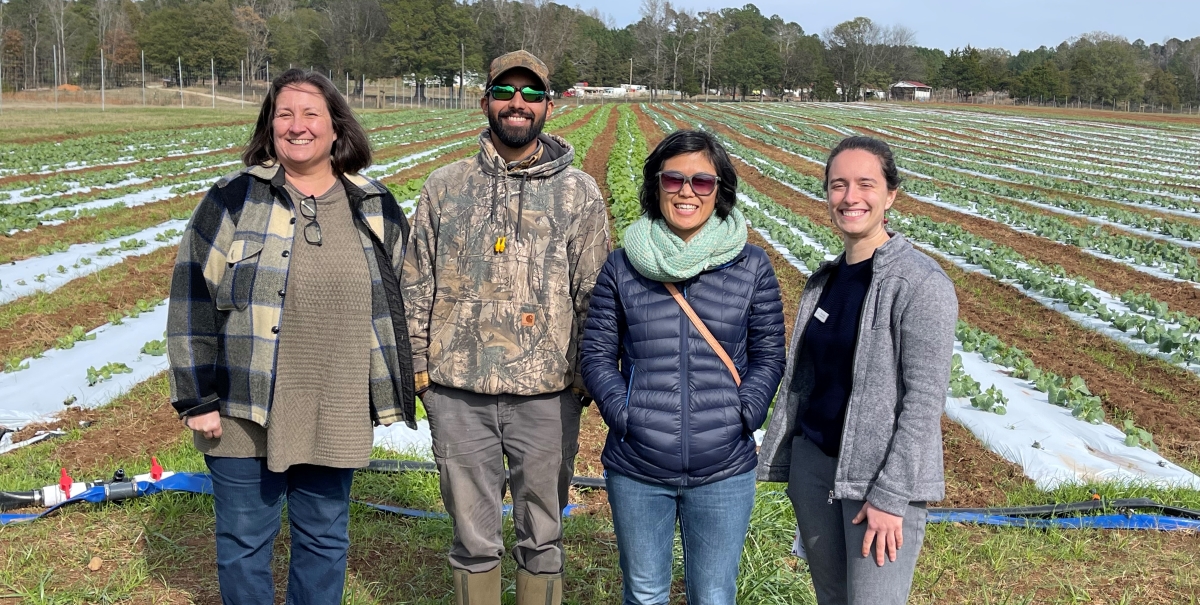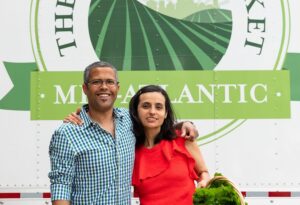Growing Together: Celebrating The Common Market and Bon Appétit Teams’ Long-Term Partnerships
- by Peter Todaro

From left to right, Bon Appétit at Emory University Sustainability Manager Julie Mulisano, Snapfinger Farm Owner Rahul Anand, The Common Market Outreach Specialist Kameko Nichols, and Bon Appétit Midwest Fellow Elise Kulers on a recent visit to Snapfinger Farm, which wholesales to The Common Market.
In 1999, Bon Appétit was the first food service company to formalize a commitment to local food systems with Farm to Fork: requiring that our culinary teams purchase 20% of their ingredients from owner-operated, small local farms. In 2021, we created an almost-quarterly series highlighting the enduring partnerships between our teams and local farmers and artisans that have resulted from Farm to Fork. But for Bon Appétit teams across the country, one of these long-running and cherished relationships has been with a non-profit food hub, rather than a farmer.
Enter The Common Market, a non-profit food distributor with a mission to empower communities through local food. When co-founders Haile Johnston and Tatiana Garcia-Granados were new residents of Philadelphia’s Strawberry Mansion neighborhood, they quickly found that swaths of their area experienced poverty and food apartheid. Inspired to help make a change, they worked as part of a community development organization, before having an “aha” moment while attending a produce auction outside of the city. At the auction, they found that small, local farmers in the counties surrounding the city lacked access to markets for their food. Haile and Tatiana saw an opportunity to connect these producers to consumers in the city – especially the people who were food-insecure in their community. The husband-and-wife duo left their jobs to found the organization that would become The Common Market, starting with one delivery truck and selling $100,000 of local food in their first year.

Haile Johnston and Tatiana Garcia-Granados. Photo credit: Common Market
The Importance of Anchor Institutions
A key element of the organization’s strategy since its early days has been its relationship with “anchor institutions” – place-based, mission-driven entities like colleges and universities, hospitals, and elder care facilities. These institutions offer stable and recurring purchases, providing a financial foundation for The Common Market’s work. Importantly, the organization works with these institutions to set up standing orders, and multi-month purchasing commitments, helping to switch the purchases of entire product categories away from big broadline food distributors to products grown or made by local folks.
One of these early anchor relationships was formed with the University of Pennsylvania, where the Bon Appétit team on campus has offered steady support since 2010. The Common Market’s logistical capabilities and willingness to pick up produce from small farmers in far-flung agricultural areas has made a big difference in the Bon Appétit team’s ability to meet their local sourcing goals. “They allow us to purchase items from vendors that may not have the logistics to make deliveries to us,” says Bon Appétit Director of Residential Dining Steven Green.“They’re consistently one of the most reliable vendors we have.” Recently, the team has worked with The Common Market to switch all of Penn’s yogurt, chicken, and select culinary staples to exclusively local options.
Elsewhere in the northeast, Bon Appétit teams in New York City, where The Common Market delivers to The Metropolitan Museum of Art and LinkedIn NYC, have served as more recent anchors, and have benefitted tremendously from their partnership with the organization. “Common Market has been a bridge between us and so many amazing local farmers and artisans, says Bon Appétit at Linkedin Director of Operations Lee Weiss. “We would never be able to coordinate offerings, orders, and deliveries with so many small local vendors and The Common Market has not only made that possible, but they have made it easy.”

Bon Appétit at Emory Sustainability Manager Julie Mulisano (left) talks shop with The Common Market Southeast Executive Director Bill Green (right)
Mission-Driven Expansion in the South, and Beyond
The Common Market has replicated its success beyond the northeast corridor, opening “The Common Market Southeast” in 2016. The Georgia-based branch of the organization has found fertile ground for its efforts in Atlanta, where Bon Appétit Sustainability Manager Julie Mulisano has worked closely with The Common Market’s Executive Director Bill Green to develop a model for mission-driven procurement with a focus on supporting farmers of color. Bill and Common Market have assisted these farmers in building capacity, assisting with obtaining GAP (Good Agricultural Practices) Certification, and of course, gaining access to markets.
“Our approach has been to fundamentally re-shape the way small farmers, and especially farmers of color can build trust with anchor institutions,” says Rachel Terry, The Common Market’s Director of Partnerships. “Through support from institutions like Emory we can build a very different relationship with small growers who understandably have mistrust in the system.” As in the northeast, Julie and the Emory team have sought to create standing orders, indicating how much of a particular product they commit to buying each week. This allows The Common Market to guarantee demand for crops, providing stable and recurring revenue to farmers, and helping to create trust. Julie and Bill have been ambitious in their pursuit of product switching, too. Recently, they embarked on an initiative which saw Emory begin to purchase ground beef and brisket from farmer Brasstown Beef. “What we’ve seen with Bon Appétit is the ability to make a switch around one or two of these core items and because these are not insignificant purchase orders, they truly have a regional impact,” says Rachel.
As the food system changes for the better in Atlanta, The Common Market has its sights set on new regions. In recent years, the organization expanded to Texas, where it found a new anchor institution partner in the Bon Appétit at St. Edward’s University team. The Common Market is now gearing up for the creation of a Great Lakes branch. As the organization expands, Bon Appétit will be ready and waiting to grow with it.